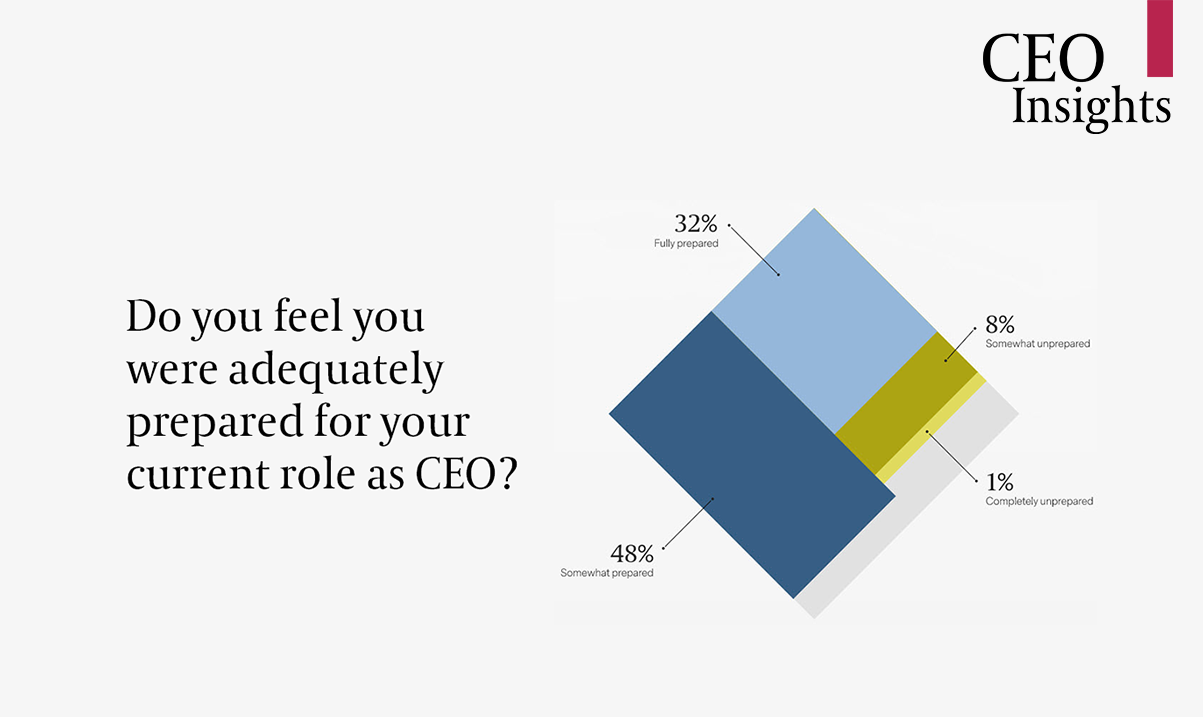Not that long ago, the idea of coaches for CEOs was frowned upon, viewed as a sign of weakness or called on as a last resort for those failing in their role. Now the outlook is dramatically different. Leading in today’s complex, uncertain world presents challenges that no amount of preparation can completely take into account. CEOs are learning to admit when they do not have the answers, and they are seeking regular, reliable guidance. “At some point, you have to ask for help,” explained one CEO attending a dinner hosted by Egon Zehnder in Boston this past winter. All twenty-four CEOs that evening agreed that coaching support is now a welcome necessity.
In our Egon Zehnder survey, The CEO: A Personal Reflection, over 400 CEOs shared their views on the changing nature of their leadership and their increasing awareness of the need for more support. Tellingly, the majority of respondents revealed they did not feel totally ready for the role (only 38% of external hires versus 28% of internal appointments felt fully prepared). Most significantly, almost 80% acknowledged the pressing need to better transform themselves in order to enact the change their companies required. CEOs know that to reach this point they need more time to pause and reflect, both before assuming the role and once in office—over half also said that the demands and pace of the CEO role make it hard to achieve the level of leadership they are capable of. Regular sessions with coaches, experts and mentors help both new and established CEOs meet these needs and continue to improve within their roles.

Source: CEO: A Personal Reflection, Egon Zehnder. 2018
The more senior a person is in a company, the less likely they are to get vital feedback from those within their organization--especially divergent perspectives or criticism. The result is that most top-tier leaders walk around with significant blind spots that can unintentionally impact the teams around them and the organization as a whole. By establishing an external network of support, leaders can safely address those areas needing attention and successfully unlock and ultimately better sustain their awareness.
Any truly useful development process (whether prior to assuming the role or as part of ongoing growth) involves working closely with the leader to help them access previously underdeveloped aspects of their personality and consider the habits and beliefs they need to change. To accomplish this, a single program or session with a coach is not enough; instead, support is most effective when understood as a regular facet of a CEO’s ongoing leadership journey. Moreover, in this complex world, it has become apparent that one coach can usually no longer meet all the needs of today’s CEOs—that a more diversified, interdependent approach is now most effective.
We simply can’t learn to be more vulnerable and courageous on our own. Sometimes our first and greatest dare is asking for support.
Brené Brown
There are so many disparate development needs pressing upon a leader today. Whether it is a deep identity shift, driving innovation and cultural transformation, choosing courage over comfort, dealing with uncooperative team members or, frequently, activist investors—no single expert can deliver it all. In response to this, a carefully crafted network of the very best resources is the optimal approach to CEO self-transformation today. For each individual CEO, the questions need to be asked: what does this person need to meet the goals at hand, and who are the most qualified experts to help guide them to those ends? From there, a creatively catered plan can be devised for each individual leader. The results of the bespoke approach speak for themselves. As an initially wary Board member put it, “the coaching and development made a big difference” with their CEO successor who “took it to heart and worked on it, and the proof is in the pudding.”
Once supported by an ecosystem of complementary resources, today’s CEOs can benefit from the increased opportunities for reflection and growth that they have told us they need. Not only should CEO leaders of the future no longer go it alone, the help they receive can shift and evolve as they do to meet the variant challenges and opportunities they will face. By first accepting the need for change and support and carefully devising the very best means of receiving it, the world’s great CEOs will be able to lead more effectively well into the future.
< Volume 1
|
Volume 3 >
|




